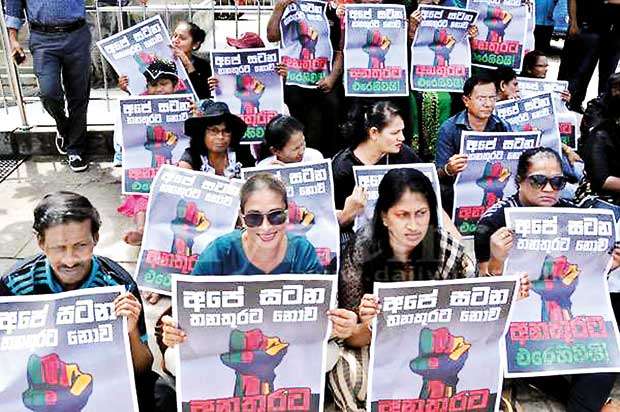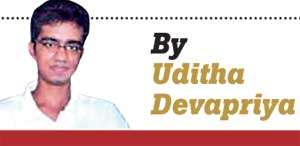Reply To:
Name - Reply Comment
Last Updated : 2024-04-24 10:25:00

 ll things considered, the 52-day government shot itself in the foot by assuming that populist legitimacy overrides constitutional legality. There are times when the one will supersede the other, but such times come about only if the government in power is so unpopular that a Restoration is called for. The truth is that the Ranil Wickremesinghe government did not covet enough unpopularity for it to be swept aside by a Rajapaksa Restoration. And the makers and of the latter Project let go of one constituent element that had a say in its downfall; the independence of the system. You can argue against the ruling of the Supreme Court, but there’s no denying the fact that, for the first time in many years, it didn’t tilt towards the man in power.
ll things considered, the 52-day government shot itself in the foot by assuming that populist legitimacy overrides constitutional legality. There are times when the one will supersede the other, but such times come about only if the government in power is so unpopular that a Restoration is called for. The truth is that the Ranil Wickremesinghe government did not covet enough unpopularity for it to be swept aside by a Rajapaksa Restoration. And the makers and of the latter Project let go of one constituent element that had a say in its downfall; the independence of the system. You can argue against the ruling of the Supreme Court, but there’s no denying the fact that, for the first time in many years, it didn’t tilt towards the man in power.
"No one, at least no one with patriotic inclinations, will support any move aimed at abolishing the Presidency unless and until these needs are met"
Then again, the man in power isn’t the man in power. Lakshman Kiriella and other members of the UNP’s Royalist Regency may oppose Maithripala Sirisena’s decision to keep certain Ministries under him, but they (begrudgingly) recognise his rights to such tokenistic powers. In other respects, Sirisena is powerless. Attorney  General Jayantha Jayasuriya’s assertion about those powers being akin to a monarch’s, read in this light, is plain nonsense on stilts. The 19th Amendment did impose checks on the man, whether or not such an act of robbing a man elected on a wide mandate, of his authority is desirable for another debate altogether.
General Jayantha Jayasuriya’s assertion about those powers being akin to a monarch’s, read in this light, is plain nonsense on stilts. The 19th Amendment did impose checks on the man, whether or not such an act of robbing a man elected on a wide mandate, of his authority is desirable for another debate altogether.
Personally (and I say this without any hesitation), I am for the Executive Presidency. But as with every power and privilege conferred on the ruler of a country it is, for the lack of a better way of putting it, a double edged sword. On the one hand it served its purpose during those heady war years when a separation of powers of the titles of the Head of State, the Head of Government and Commander of the Armed Forces would have been disastrous. On the other hand, with a series of unfortunate rulings that gave carte blanche to the president in the Rajapksa era and even before it, denigrated the idea of parliamentary supremacy and turned parliament into a spectacle.
"I do not blame Ranil Wickremesinghe. Nor do I blame Maithripala Sirisena and Mahinda Rajapaksa. Nor do I blame the system."
Despite my prejudices against the institution, however, I will make one thing clear. In 2015 the mandate given by 6.2 million voters was to change the governance structures that had been in place since J.R. Jayewardene’s presidency and had been exploited to bring about sweeping powers for and by Mahinda Rajapaksa. But such a mandate does not by itself exclude the Executive Presidency.
This is not because past historical experience indicates clearly that other forms of governance in Sri Lanka have had their share of abuse(r)s. This is also because, given the penchant of politicians and of voters to change allegiances, an alternative to the Executive Presidency must satisfy the primary needs of a country: sovereignty of the country and sovereignty of the people.
"A people’s sovereignty, on the other hand, rests fairly and squarely upon an institution to which lawmakers have been elected, not selected, and from which those lawmakers can be ejected"
No one, at least no one with patriotic inclinations, will support any move aimed at abolishing the Presidency unless and until these needs are met. There is a problem, however; a country’s sovereignty, in the populist sense of that term, is best served by a powerful Leviathan-like figure, the epitome of which, in Sri Lanka, was J.R. and Mahinda (and to a lesser extent, Premadasa). A people’s sovereignty, on the other hand, rests fairly and squarely upon an institution to which lawmakers have been elected, not selected, and from which those lawmakers can be ejected. There is then a clash, a contradiction, if not contradistinction, among the arms of the State which stand for these two “sovereignties”, the Executive and the Legislature. No, I am not suggesting here that “people power” (“jana balaya”) is at odds with nationalism. In fact far from it being so, be it in the West or the East, there are times when the two will coincide. But in the popular myth of yahapalanaya and  democracy perpetuated by the present government, the two cannot be one and the same.
democracy perpetuated by the present government, the two cannot be one and the same.
And why? Because in postcolonial societies like Sri Lanka, politicians look up to the ideal of a political –ism over its reality even as the other part of the world occupied by the “international community” engage in doublespeak and both champion, say, human rights AND de-validate them by propping up dictatorships friendly to them. This is a tragedy because the political debate in postcolonial countries is dichotomised between the democrats and the populists. It is a dichotomy refracted by the Western media: those who win elections are portrayed as demagogues, and those in the Opposition are portrayed as democrats fighting for people who never voted them in! We saw this clearly in the 52-day Mahinda-Maithripala government. Shades of grey were abandoned, and in the rush to validate the ousted government, commentators and apologists (from the left and right) depicted the political scene as a battle between good and evil, light and darkness, decency and demagoguery, erudition and ignorance; in a word, between democrats and populists. As if demagogues can’t be decent, as if the uneducated are worse than the educated, as if democrats can’t be populists!
"The yahapalanist discourse is hence in a shambles. It is dominated by intellectuals and artistes who project themselves as the superiors of politicians and ideologues"
The yahapalana discourse is based on these dichotomies and they are, far worse I should think, perpetuated by everyone. Amila Muthukutti in an article titled “The Rise of Social Media and Fall of Mainstream Media” makes the case for the Facebook generation and denigrates the “lamestream” media outlets which were in favour of the Rajapaksas. But with all due respect, there is nothing different between the one and the other; social media activists are just as blinded by political loyalties and good/bad binaries in the yahalapanist scheme of things as the traditional media are by its fawning to such binaries in the Rajapaksist scheme of things.
I do not blame Ranil Wickremesinghe. Nor do I blame Maithripala Sirisena and Mahinda Rajapaksa. Nor do I blame the system. I blame the way everyone, including those who market themselves as neutral political players, has let the debate over such important issues as the Executive Presidency and good governance slip into a series of meaningless, simplistic, reductionist dichotomies.
These dichotomies are what account for the popular myth, sustained predominantly by the young, but also the “educated” middle class, that the ousted government was the last real hope they could resort to. When arguments to the tune of, “We aren’t for Ranil but we are for democracy” are being made by activists who a) Didn’t as much as open their mouths when the Central Bank was being robbed and b) Distinguish between the ideal and the man they inadvertently champion as the best candidate to make that ideal a reality, I can hence only laugh.
"We used to believe, when we were small, that politicians were bad and the people who rebelled against them were good"
The yahapalanist discourse is hence in a shambles. It is dominated by intellectuals and artistes who project themselves as the superiors of politicians and ideologues. They are not. The case of Dambara Amila, Sarath Wijesuriya, and Gamini Viyangoda should make this evident for everyone and anyone. In that sense the discontent channelled by the actor, the playwright, and the intellectual over the past few weeks has been, for the most, a farce. There’s nothing to suggest, nothing substantive, that these purveyors of good governance are better representatives of the people than those we have elected. There’s nothing to bear out their low opinion of populism because their own programme for a better polity, despite the resonant phrase and the outbursts of self-righteous fury (remember Manuwarna’s “kalakanni Disneylanthaya?), amounts to little.
We used to believe, when we were small, that politicians were bad and the people who rebelled against them were good. But then the politicians were people once and people also have within themselves the tendency to enrich themselves. Unfortunately for us, though, the yahalapanaya debate, since 2015, has been dominated by this good/bad view. In this scheme of things, civil society, from intellectuals making grandiloquent claims for neoliberal compradores to good governance activists going mum over the actions of the government, has been given enough carte blanche.
“The Rise of Social Media and Fall of Mainstream Media” makes the case for the Facebook generation and denigrates the “lamestream” media outlets which were in favour of the Rajapaksas"
Next week I’ll explain why that good/bad rift that civil society has brought up between the people and their representatives is so simplistic that it has succeeded in concealing more insidious forms of power structures and hierarchies. For now I’ll end with a contention: no amount of debate over the Executive Presidency, that most potent and hated symbol of the Rajapaksa Era (an era of darkness for those who have forgotten J.R. and Premadasa and Chandrika), will be constructive unless we look beyond the “we-are-holier-than-them” attitude of civil society activism.

Add comment
Comments will be edited (grammar, spelling and slang) and authorized at the discretion of Daily Mirror online. The website also has the right not to publish selected comments.
Reply To:
Name - Reply Comment
US authorities are currently reviewing the manifest of every cargo aboard MV
On March 26, a couple arriving from Thailand was arrested with 88 live animal
According to villagers from Naula-Moragolla out of 105 families 80 can afford
Is the situation in Sri Lanka so grim that locals harbour hope that they coul